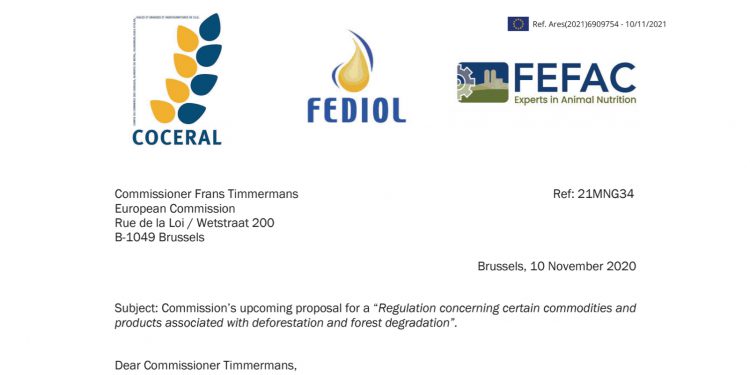Greenpeace Unearthed has found that trade groups representing some of the world’s biggest soya traders lobbied the EU to weaken its landmark deforestation policy, just days after they had also signed a public pledge to end commodity-driven deforestation.
In a letter sent to EU climate commissioner Frans Timmermans in the final days of the COP26 climate conference, three leading agricultural trade associations warned that the EU’s proposed deforestation legislation would cause “major price increases and problems of availability” for grains and animal feed.
The trade associations – Coceral, Fediol and Fefac- represent five of the firms – ADM, Bunge, Cargill, LDC and Viterra – that signed a COP26 statement of purpose describing “a shared commitment to halting forest loss associated with agricultural commodity production and trade”.
The trade associations also released a detailed public position on the law two weeks ago. Their concerns focus on two key components.
The first relates to creating a “segregated supply chain” of deforestation-free products for the European market, which they describe as “technically and effectively not feasible at full market scale.”
Instead the groups advocate for ‘mass balance,’ which is when suppliers procure at least some of their product from sustainable sources, but that can then be mixed with crop from deforested land. Critics call these schemes greenwashing that allow deforestation to continue.
The second reform the groups take issue with is intended to improve traceability, by requiring traders to provide a geolocation for the farm or plantation where the commodity was grown, thereby establishing whether it came from deforestation.
The groups told Timmermans the EC’s “high requirements” for traceability were laden with “confidentiality concerns” – some farmers may refuse to share this data with the EU – and “commercial sensitivity.”
However, some smallholder farmer groups argue that these proposals would benefit their members.
Groups representing nearly 35,000 smallholder cocoa farmers in the Ivory Coast argue that these measures are “not only about tackling deforestation,” but about “social equity and an opportunity to put in place mechanisms that allow producers, the first actors in the supply chain, to make a decent living from their work.”
The smallholder farmers support clear traceability requirements that could help clean up the cocoa sector, from facilitating secure electronic payments to simplifying the supply chain and cutting out middlemen.























